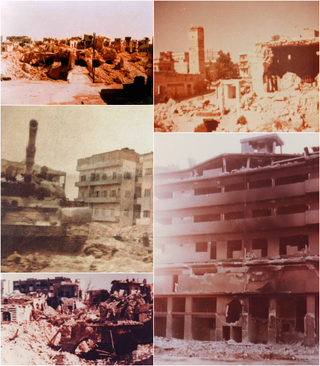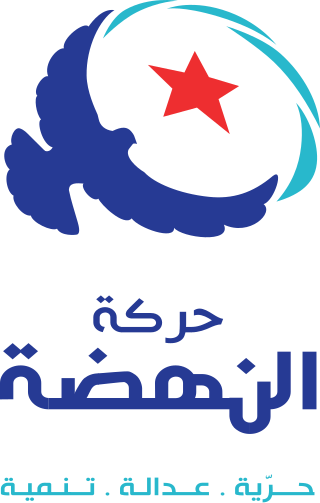Related Research Articles
Antisemitism has increased greatly in the Arab world since the beginning of the 20th century, for several reasons: the dissolution and breakdown of the Ottoman Empire and traditional Islamic society; European influence, brought about by Western imperialism and Arab Christians; Nazi propaganda and relations between Nazi Germany and the Arab world; resentment over Jewish nationalism; the rise of Arab nationalism; and the widespread proliferation of anti-Jewish and anti-Zionist conspiracy theories.
Anti-Arabism, Anti-Arab sentiment, or Arabophobia includes opposition to, dislike, fear, or hatred of Arab people.
The Middle East Media Research Institute is a nonprofit press monitoring and analysis organization co-founded by former Israeli military intelligence officer Yigal Carmon and Israeli-American political scientist Meyrav Wurmser. Headquartered in Washington, D.C., MEMRI publishes and distributes free English-language translations of Arabic, Persian, Urdu, Pashto, and Turkish media reports.

The Hama Massacre, or Hama Uprising, occurred in February 1982 when the Syrian Arab Army and the Defense Companies, under orders of the country's president Hafez al-Assad, besieged the town of Hama for 27 days in order to quell an uprising by the Muslim Brotherhood against al-Assad's government. The massacre, carried out by the Syrian Army under commanding General Rifaat al-Assad, effectively ended the campaign begun in 1976 by Sunni Muslim groups, including the Muslim Brotherhood, against the government.

Human rights in the Middle East have been shaped by the legal and political development of international human rights law after the Second World War, and their application to the Middle East. The 2004 United Nations Arab Human Development Report (AHDR) claimed that although Arab-Islamic tradition does hold unique importance for ideas of human welfare, History has proven that "they were not sufficiently prevalent in society to foster a culture based on a political contract, and allow for the legitimacy of differences of opinion, dialogue and transfer of power." Issues of the validity of democracy in the region and human rights are at the very centre of the challenges facing Middle Eastern society today.

Human rights in the State of Palestine refers to the human rights record in the West Bank and Gaza.

Human rights in Egypt are guaranteed by the Constitution of the Arab Republic of Egypt under the various articles of Chapter 3. The country is also a party to numerous international human rights treaties, including the International Covenant on Civil and Political Rights and the International Covenant on Economic, Social and Cultural Rights. However, the state of human rights in the country has been criticized both in the past and the present, especially by foreign human rights organizations such as Amnesty International and Human Rights Watch. As of 2022, Human Rights Watch has declared that Egypt's human rights crises under the government of President Abdel Fattah al-Sisi, is "one of its worst ... in many decades", and that "tens of thousands of government critics, including journalists, peaceful activists, and human rights defenders, remain imprisoned on abusive 'terrorism' charges, many in lengthy pretrial detention." International human rights organizations, such as the aforementioned HRW and Amnesty International, report that as of January 2020, there are some 60,000 political prisoners in Egypt. Other complaints made are of authorities harassing and detaining "relatives of dissidents abroad" and use of "vague 'morality' charges to prosecute LGBT people, female social media influencers, and survivors of sexual violence". The Egyptian government has frequently rejected such criticism, denying that any of the prisoners it holds are political prisoners.

Bahrain's record on human rights has been described by Human Rights Watch as "dismal", and having "deteriorated sharply in the latter half of 2010". Their subsequent report in 2020 noted that the human rights situation in the country had not improved.

Rached Ghannouchi, also spelled Rachid al-Ghannouchi or Rached el-Ghannouchi, is a Tunisian politician, the co-founder of the Ennahdha Party and serving as its intellectual leader. He was born Rashad Khriji.

Sarah Leah Whitson is an American lawyer and the executive director of Democracy for the Arab World Now (DAWN). She previously served as director of the Middle East and North Africa division of Human Rights Watch.
Racism in the Arab world covers an array of forms of intolerance against non-Arabs and the expat majority of the Arab states of the Persian Gulf coming from groups as well as Black, European, and Asian groups that are Muslim; non-Arab ethnic minorities such as Armenians, Africans, the Saqaliba, Southeast Asians, Jews, Kurds, and Coptic Christians, Assyrians, Persians and other Iranic peoples, Turks, Turkmens and other Turkic peoples, and South Asians living in Arab countries of the Middle East.

Mohamed Moncef Marzouki is a Tunisian politician who served as the fifth president of Tunisia from 2011 to 2014. Through his career he has been a human rights activist, physician and politician. On 12 December 2011, he was elected President of Tunisia by the Constituent Assembly.
The Congress for the Republic, also referred to as El Mottamar or by its French acronym CPR, is a centre-left secular political party in Tunisia. It was created in 2001, but legalised only after the 2011 Tunisian revolution. Its most prominent founder and long-term leader was Moncef Marzouki. He had been the party's honorary president since he became interim President of Tunisia in December 2011.

The Ennahda Movement, also known as the Renaissance Party or simply known as Ennahda, is a self-defined Islamic democratic political party in Tunisia.

Mohammad Reza Naqdi is a senior officer in the Revolutionary Guards.

The issue of human rights in Tunisia, is complex, contradictory, and, in some regards, confusing in the wake of the Tunisian revolution that began in January 2011 and overthrew the longstanding dictatorship of Zine El Abidine Ben Ali. While the immediate months after the revolution were characterized by significant improvements in the status of human rights, some of those advances have since been reversed. The situation remains in a state of flux, with different observers providing virtually irreconcilable accounts of the current status of human rights in that country.

Women played a variety of roles in the Arab Spring, but its impact on women and their rights is unclear. The Arab Spring was a series of demonstrations, protests, and civil wars against authoritarian regimes that started in Tunisia and spread to much of the Arab world. The leaders of Tunisia, Egypt, Libya, and Yemen were overthrown; Bahrain has experienced sustained civil disorder, and the protests in Syria have become a civil war. Other Arab countries experienced protests as well.

Middle East Eye (MEE) is a London-based news website covering events in the Middle East and North Africa. MEE describes itself as an "independently funded online news organization that was founded in April 2014." MEE seeks to be the primary portal of Middle East news, and describes its target audience as "all those communities of readers living in and around the region that care deeply for its fate".
Tufail Ahmad is a British journalist and political commentator of Indian origin. He has been the Director of the South Asia Studies Project at the Middle East Media Research Institute (MEMRI) in Washington, D.C. In his recent writings, he was described as a Contributing Editor at Firstpost and as Executive Director of the Open Source Institute (OSI), New Delhi.
Freedom Flotilla III (#FF3) was a flotilla that planned to break the blockade of the Gaza Strip by Israel by sailing to Gaza. It started from Sweden on 10 May 2015 and stopped in several European cities along the way to Gaza. It started officially from Athens, Greece on 25 June 2015. Few details were released in advance.
References
- ↑ "Finance and Competitiveness in Developing Countries".
- ↑ "The Middle East Institute - Columbia University". Archived from the original on 2011-12-11.
- 1 2 "Tunisian Progressive: 'Islamism is The Mother of All Big Lies'". MEMRI - The Middle East Media Research Institute.
- ↑ "Tunisia - a Lawsuit Against the Human Rights League, an Assault on All ..."
- ↑ "The Arab Silence on Darfur". MEMRI - The Middle East Media Research Institute.
- ↑ "The Darfur – Israel Connection". aishcom. Retrieved 2018-07-12.
- ↑ http://97.74.65.51/readArticle.aspx?ARTID=25965 [ dead link ]
- ↑ "Arabs Speak Frankly on the Arab-Israeli Conflict".
- ↑ Human Rights Watch (2001). Tunisia - a Lawsuit Against the Human Rights League, an Assault on All Rights Activists. New York: Human Rights Watch. p. 18.
- ↑ Dailymotion#Tunisia
- ↑ "Journalist assaulted and threatened". IFEX.
- ↑ http://www.tunisnews.net/2930decembre00.eml Archived 2011-10-01 at the Wayback Machine